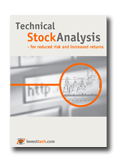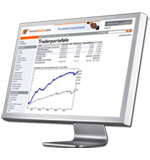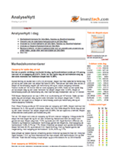Strategies in volatile markets
Published 17 March 2022.
Written by Head of Research and Analysis Geir Linløkken and Fund Manager Mads Grønstad
Abstract
In times of great uncertainty, stock markets fluctuate more than usual. High volatility offers greater opportunities, but also higher risk. If you need cash soon, within one to five years, we recommend being careful and keeping funds you cannot afford to lose out of the stock market. If you are a long-term investor, we recommend being fully invested, and having a higher threshold than usual for replacing shares. Active traders may find good opportunities in stocks that have triggered short-term buy signals, but also in stocks that have decreased in value, especially if insiders purchased these stocks at the same time. However, note the risk of prices continuing to fall.
Volatile markets – cause and effect
Shocking events
It is often incidents with large and confusing consequences that result in large price falls. Such scenarios are very unlikely to be anticipated, which is why resulting fluctuations are so great.
High degree of uncertainty
Investors hate uncertainty. Insecure investors seek security. When the news are constantly changing, uncertainty becomes high.
Larger fluctuations than usual
Volatility is almost synonymous with fluctuation. Periods of large fluctuations are nerve-racking for many investors. Should they buy more, or should they sell everything? Broad research shows that after a period of high volatility, a new period of high volatility statistically follows.
Frequent risk-off and risk-on shifts
Nervous investors are easily influenced by news. When the news is negative, they fear a fall, and seek security. This is «risk-off». When is the news is positive, investors are greedier, and seek upsides. This is «risk-on». Switches between optimism and pessimism can happen very quickly in volatile markets, and it can be hard to keep up.
Large price movements
Opportunities for large price falls and large price increases in the short term. It depends which way the news turn and can be very difficult to predict. Many say that "the market is always right", but in crises new information comes frequently and moves the market.
Many short-term technical signals
Large movements easily break support or resistance levels, or trigger other signals.
Frequent false signals and reversals
When the news are constantly changing and contradictory from one day to the next, false technical signals are easily triggered. At the same time, signals can warn of large price movements at an early stage.
Individual stocks can fall a lot
If the stock market falls 5 per cent, a medium risk stock can easily fall 10, and a high risk one fall 20. It is easy to be intimidated by such falls. When the market reversal then occurs, however, the stocks that have fallen the most may be the ones that rise the most.
Recommendation for short-term investors
This applies to investors who are in the market now, but who need all, or part of, their money soon.
Risk of loss
There is always a risk of losing money in the stock market. In volatile markets, the risk of large losses can be several times higher than normal. Remember that high volatility very often follows high volatility. The risk of winning is also higher than normal, and if you can handle the fluctuations, appreciate the excitement, sleep well at night and potentially handle losing a lot of money, then remain in the market.
Secure the funds you need
However, if you need your money within one to five years, we recommend selling for the amount you need. It could be that you are planning to buy a new house, cottage or car, that you are planning to give an inheritance advance, or that you have uncertain capital requirements. It would be terribly uninspiring to run short of cash when the dream house comes up for sale or your children need help getting into the housing market.
Think of the consequences
Try to think in terms of consequences. What happens if the market falls 50 per cent? Will I still be able to do what I want, with a certain safety margin? Or can’t I do what I want right now anyway, regardless of whether I secure all funds, but need a price increase of say 30 or 50 per cent in order to realize my dream?
Recommendation for long-term investors
Most people who invest in the stock market are long-term investors. And that is good. The stock market fluctuates in the short term, but in the long term it has been shown to provide better returns than bank deposits, real estate and other forms of savings. This is despite the fact that stock market corrections occur at irregular intervals and that about once a year there is a significant fall of 9-12 per cent (article in Norwegian).
Be invested
The most important piece of advice for long-term investors is to be continuously invested in the market. It is difficult to time entry and exit in the short term. Once you have sold, it can be very difficult to buy again at the right time during a fall. For instance, if you are not in the market and have watched the stock market rise and share prices increase, it can be psychologically difficult to buy again.
Retain risk exposure
When you chose to enter the stock market, you may have made some assessments about your desired level of risk. In times of frequent risk-off and risk-on shifts, investors' appetite for risk will fluctuate sharply. If you then try to switch between low-risk and high-risk stocks, it is easy to make mistakes. One piece of advice is thus to keep risk exposure unchanged. You can weigh risk exposure a little down or up, but preferably while doing this as a result of higher risk awareness, and as part of a long-term investment strategy.
Diversification
In some crises, such as for energy stocks during the outbreak of the Ukraine war, some sectors can perform very strongly. These may then give strong technical signals. However, be aware of spreading risk across multiple sectors. Pay attention to buy signals, certainly, but do not buy ten energy shares and no shares from other sectors. Have a closer look at your portfolio. Is it well distributed across different sectors?
Prepare for fluctuations
Stock prices will vary, maybe a great deal! Be prepared for large fluctuations, so that you are better able to handle them when they happen. You can more easily overcome your own fears and psychological factors, and thus be able to remain in the market. You may even find opportunities when others make fearful mistakes.
Higher threshold than usual for replacing stocks
Large fluctuations mean that individual stocks can easily trigger buy and sell signals. This also means that price movements can easily be reversed and signals turn out to be false. As a result, have a higher threshold than usual for replacing stocks. We recommend emphasizing technical signals a little less than usual, especially short-term signals.
At the same time, we recommend watching insiders more closely. Board members, directors and other insiders know the companies and markets in which they operate better than most. When they invest their own savings in a stock, it is because they see good opportunities for long-term price increases. Insider purchases provide security. During previous crises, especially the corona crash, we saw that stocks with insider buys in retrospect did significantly better than other stocks (article in Norwegian).
Recommendation for active traders
This applies to those who are in the market long-term, but who want to take advantage of opportunities and are active traders.
Opportunities are created
A stock market crash and high volatility is a dream scenario for active traders. Opportunities are now being created. We can see great fear and mispricing, and stocks can rise dozens of per cents in a day or week. But it is also now that stocks can fall victim to mass fear, 50 per cent falls, or even that companies may go bankrupt.
Stay invested
The advice to those who are aware that they are traders, and who can tolerate this high risk, is first and foremost to stay in the market. Do what you always do, try to rise above the chaos that sometimes prevails, and watch out for the opportunities it offers.
Seek opportunities
This is mainly a risk assessment. If you want high upside, you can trade following short-term signals in the most volatile stocks. If you are looking for more security, you can trade following more long-term signals in less volatile stocks. Opportunities come in both classes and in between.
Early signals
If you know what you are looking for, you can act faster when the situation arises. Reactions upwards from support, at high volume, may be among the earliest signals. Great potential, but also high risk of reversal and fall. Breaks upwards from resistance can signal a change of focus and increasing buy interest, and have historically been among the strongest signals.
Panic selling and forgotten stocks
Sometimes stocks just keep falling for a long period of time. It is basically a sign that investors are becoming more and more pessimistic, and that the company is experiencing problems. In crises, such shares may have a disproportionately strong price fall. Especially if this happens without there being specific news about the company, and at high volume, it can be a so-called "sell-off". In these scenarios, investors have almost sold in a panic to get out. This is very high risk, but it sometimes offers very good buy opportunities.
Look to insiders
A factor that reduces risk, is when insiders trade. Insiders are in it for the long term and they see through crises. They have historically bought in the wake of falling prices and have been rewarded with higher price increases than other stocks. Investtech offers insider trade analysis for the Norwegian, Swedish and Danish markets.
Prepare for large fluctuations
Yes, prices will continue to vary. Yes, it will affect your portfolio. And, yes, you will regret trades you made. Prepare for this and it will be easier to cope. And it will be easier to succeed when opportunities arise and to stand by your decisions.
Summary
Short-term investors: Sell now what you cannot afford to lose.
Long-term investors: Remain in the market. Less emphasis on technical signals, more emphasis on what insiders do.
Active traders: Many opportunities now. Search for forgotten stocks and sell-offs. Insider buys reduce risk.
Good luck!
Written by

Head of Research and Analysis
at Investtech
Insider buys during the Covid pandemic
The figure shows price development following insider buys in the period 2019-2020 in the Nordic markets, which includes trades during the Corona panic. The chart shows development from ten days before the insider purchase was announced to six months after. Stocks with insider buys (wide blue line) did significantly better than benchmark (thin line).
Sell off
The figure illustrated a sell off. A significant price fall on very high volume in a falling trend may indicate a sell off. Following a long list of negative news, the last investors give up. If the price then rises and volume increases, it signals that the investors have been as negative as they can possibly get and that optimism is returning.
Please note, however, that falling trends often last for a long time, and disappointment is often followed by more disappointment. Beware of buying into the stock after a fall like this, at least until a clearly positive volume development is seen, preferably in combination with a short term positive overall trend. And even then the risk will still be high.
Click on the chart for more about volume analyses.
"Investtech analyses the psychology of the market and gives concrete trading suggestions every day."

Partner & Senior Advisor - Investtech
Investtech guarantees neither the entirety nor accuracy of the analyses. Any consequent exposure related to the advice / signals which emerge in the analyses is completely and entirely at the investors own expense and risk. Investtech is not responsible for any loss, either directly or indirectly, which arises as a result of the use of Investtechs analyses. Details of any arising conflicts of interest will always appear in the investment recommendations. Further information about Investtechs analyses can be found here disclaimer.
The content provided by Investtech.com is NOT SEC or FSA regulated and is therefore not intended for US or UK consumers.
Investtech guarantees neither the entirety nor accuracy of the analyses. Any consequent exposure related to the advice / signals which emerge in the analyses is completely and entirely at the investors own expense and risk. Investtech is not responsible for any loss, either directly or indirectly, which arises as a result of the use of Investtechs analyses. Details of any arising conflicts of interest will always appear in the investment recommendations. Further information about Investtechs analyses can be found here disclaimer.
The content provided by Investtech.com is NOT SEC or FSA regulated and is therefore not intended for US or UK consumers.


 Oslo Børs
Oslo Børs Stockholmsbörsen
Stockholmsbörsen Københavns Fondsbørs
Københavns Fondsbørs Helsingin pörssi
Helsingin pörssi World Indices
World Indices US Stocks
US Stocks Toronto Stock Exchange
Toronto Stock Exchange London Stock Exchange
London Stock Exchange Euronext Amsterdam
Euronext Amsterdam Euronext Brussel
Euronext Brussel DAX
DAX CAC 40
CAC 40 Mumbai S.E.
Mumbai S.E. Commodities
Commodities Currency
Currency Cryptocurrency
Cryptocurrency Exchange Traded Funds
Exchange Traded Funds Investtech Indices
Investtech Indices



